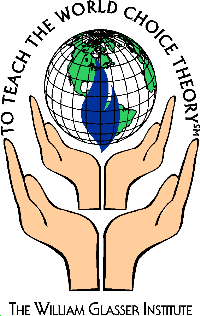CHOICE THEORY PSYCHOLOGY
This site is dedicated to the
William Glasser Institute's mission to teach the world Choice Theory Psychology.
 | Choice
Theory
by William Glasser, M.D. | Click on book title to buy direct from Amazon.com! |
Choice Theory Psychology is a new explanation of human behavior developed by Dr. William Glasser, M.D.
|
The Ten Axioms of Choice Theory
|
- The only person whose behavior we can control is our own.
- All we can give another person is information.
- All long-lasting psychological problems are relationship problems.
- The problem relationship is always part of our present life.
- What happened in the past has everything to do with what we are today, but we can only satisfy our basic needs right now and plan to continue satisfying
them in the future.
- We can only satisfy our needs by satisfying the pictures in our Quality World.
- All we do is behave.
- All behavior is Total Behavior and is made up of four components: acting, thinking, feeling and physiology.
- All Total Behavior is chosen, but we only have direct control over the acting and thinking components. We can only control our feeling and physiology indirectly through how we choose to act and think.
- All Total Behavior is designated by verbs and named by the part that is the most recognizable.
|
|
|
|
|
Nothing on this site is original! I have borrowed from materials developed
by others in the Choice Theory community. My intent is to give credit where due, so, if you recognize any of this
as someone else's work not already attributed, please notify me by email (webmaster at choicetheory.com) so I can give proper attribution.
Materials and opinions found on this website include those not necessarily representative of Dr. Glasser's current work.
This website is not affiliated with Dr. Glasser or the William Glasser Institute.
|
|
Lee W. Furr, MS, Reality Therapy Certified,
Faculty, William Glasser Institute
W Hugh Furr, PhD, LPC, LMFT, Reality Therapy Certified
This page is maintained by "webmaster at choicetheory.com".
Site Map
© 2005 2006
Personal Resources Development


